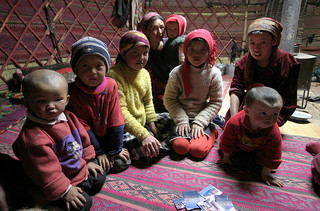 According to UNESCO education statistics, Tajikistan has a nearly universal literacy rate that is rather a substantial achievement for an economically hard-pressed country. Despite such numbers, the education system faces a dire teacher shortage that is affecting the quality of education. With the birth rate increasing exponentially, the teacher shortage would continue to exacerbate the country’s economic development, as fewer and fewer children are exposed to quality curriculums and skills in the classroom. Tajikistan local media reported in 2010 that the country’s 3,780 schools taught 1.6 million school-age children. The number of school-age children continues to increase as the high birthrate and the requirement for nine years of compulsory education further place pressures on schools.
According to UNESCO education statistics, Tajikistan has a nearly universal literacy rate that is rather a substantial achievement for an economically hard-pressed country. Despite such numbers, the education system faces a dire teacher shortage that is affecting the quality of education. With the birth rate increasing exponentially, the teacher shortage would continue to exacerbate the country’s economic development, as fewer and fewer children are exposed to quality curriculums and skills in the classroom. Tajikistan local media reported in 2010 that the country’s 3,780 schools taught 1.6 million school-age children. The number of school-age children continues to increase as the high birthrate and the requirement for nine years of compulsory education further place pressures on schools.
Many explain that teachers are leaving the profession primarily due to low salaries. Tajik government figures show that the average monthly salary for a teacher is about US $56. The average monthly salary in the country is about US $70. Teachers are thus among one of the lowest paid professionals, making it virtually impossible for many to survive in such financial conditions. The education program manager for the Aga Khan Foundation says that the teaching profession has a low social status because of the low wages. People in higher education would rather find jobs outside of schools, and only those with few options would become teachers. The Tajikistan Education Ministry admits that the pay issue is a critical problem in the system, as the lack of qualified teachers could potentially affect the quality of the future Tajik workforce.
The Tajikistan Education Ministry admits that at least 10,000 of the country’s teachers lack the basic qualifications and credentials. Experts said the declining Tajik education system stemmed from a devastating civil war in the 1990s, in which the whole country has yet to recover from the trauma. Previously, under the Soviet system, teaching standards were more enforced. Teachers would have to attend regular training courses throughout their careers and pass qualification exams to ensure continuity in methodology and pedagogy. Nowadays, the Tajik government lacks the resources to check teacher qualifications, leaving school children and Tajik society vulnerable to unqualified instructors and understaffed schools.
Creative Commons Love: Yodod on Flickr.com

















